Dipole dipole forces Guides d'étude, Notes de cours & Résumés
Vous recherchez les meilleurs guides d'étude, notes d'étude et résumés sur Dipole dipole forces ? Sur cette page, vous trouverez 617 documents pour vous aider à réviser pour Dipole dipole forces.
Page 2 sur 617 résultats
Trier par
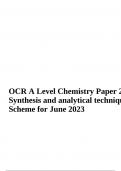
-
OCR A Level Chemistry Paper 2 (H432/02) Synthesis and analytical techniques Mark Scheme for June 2023 (Verified)
- Examen • 38 pages • 2024
-
- $13.99
- + en savoir plus
OCR A Level Chemistry Paper 2 (H432/02) Synthesis and analytical techniques Mark Scheme for June 2023 (Verified) Trend for all 3 hydrocarbons (1 mark): Boiling point increases with less branching OR less methyl/alkyl groups/side chains Explanation with comparison (3 marks): Branching and surface contact (Less branching gives) more (surface) contact / interaction (between molecules) Surface contact and London forces (More surface contact) gives more /stronger induced dipole(–di...

-
BTEC Applied Science Unit 1 Chemistry (Graded)
- Examen • 31 pages • 2024
-
- $12.99
- + en savoir plus
BTEC Applied Science Unit 1 Chemistry (Graded) How many electrons can a d subshell hold? correct answer10 Which subshells are available in the first energy level? correct answers Which subshells are available in the second energy level? correct answers and p Which subshells are available in the third energy level? correct answers, p and d What is Hund's rule? correct answerOrbitals must all be singly filled before they can be doubly occupied Which elements do not fill the 4s subshell befor...

-
OCR A Level Chemistry Paper 2 (H432/02) Synthesis and analytical techniques Mark Scheme for June 2023 (Verified)
- Examen • 38 pages • 2024
-
- $12.99
- + en savoir plus
OCR A Level Chemistry Paper 2 (H432/02) Synthesis and analytical techniques Mark Scheme for June 2023 (Verified) Trend for all 3 hydrocarbons (1 mark): Boiling point increases with less branching OR less methyl/alkyl groups/side chains Explanation with comparison (3 marks): Branching and surface contact (Less branching gives) more (surface) contact / interaction (between molecules) Surface contact and London forces (More surface contact) gives more /stronger induced dipole(–di...
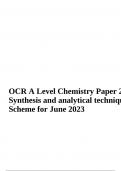
-
OCR A Level Chemistry Paper 2 (H432/02) Synthesis and analytical techniques Mark Scheme for June 2023 | Verified.
- Examen • 38 pages • 2024
-
- $13.49
- + en savoir plus
OCR A Level Chemistry Paper 2 (H432/02) Synthesis and analytical techniques Mark Scheme for June 2023 | Verified. Trend for all 3 hydrocarbons (1 mark): Boiling point increases with less branching OR less methyl/alkyl groups/side chains Explanation with comparison (3 marks): Branching and surface contact (Less branching gives) more (surface) contact / interaction (between molecules) Surface contact and London forces (More surface contact) gives more /stronger induced dipole(–d...
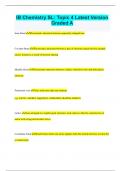
-
IB Chemistry SL: Topic 4 Latest Version Graded A
- Examen • 30 pages • 2024
-
Disponible en pack
-
- $10.49
- + en savoir plus
IB Chemistry SL: Topic 4 Latest Version Graded A Ionic Bond Electrostatic attraction between oppositely charged ions Covalent Bond Electrostatic attraction between a pair of electrons and positively charged nuclei, formed as a result of electron sharing Metallic Bond Electrostatic attraction between a lattice of positive ions and delocalized electrons Polyatomic ions ions with more than one element e.g. CaCO3, Al(OH)3, Mg(NO3)2, (NH4)2SO4, Ba3PO4, LiHCO3 Lattice ions arran...
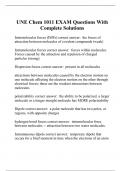
-
UNE Chem 1011 EXAM Questions With Complete Solutions
- Examen • 24 pages • 2023
-
Disponible en pack
-
- $12.99
- + en savoir plus
Intermolecular forces (IMFs) correct answer: the forces of attraction between molecules of covalent compounds (weak) Intramolecular forces correct answer: forces within molecules. Forces caused by the attraction and repulsion of charged particles (strong) Dispersion forces correct answer: present in all molecules attractions between molecules caused by the electron motion on one molecule affecting the electron motion on the other through electrical forces; these are the weakest inter...

-
BTEC Applied Science Unit 1 Chemistry - Distinction.
- Examen • 31 pages • 2024
-
- $13.49
- + en savoir plus
BTEC Applied Science Unit 1 Chemistry - Distinction. How many electrons can an s subshell hold? correct answer2 How many electrons can a p subshell hold? correct answer6 How many electrons can a d subshell hold? correct answer10 Which subshells are available in the first energy level? correct answers Which subshells are available in the second energy level? correct answers and p Which subshells are available in the third energy level? correct answers, p and d What is Hund's rule? correct ...
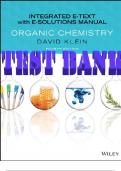
-
TEST BANK for Organic Chemistry: 4th Edition by David R Klein. INTEGRATED WITH SOLUTIONS MANUAL. (All Chapters 1-27 Q&A)
- Autre • 2150 pages • 2024
-
- $22.99
- + en savoir plus
TABLE OF CONTENTS 1 A Review of General Chemistry 1.1 Introduction to Organic Chemistry 1.2 The Structural Theory of Matter 1.3 Electrons, Bonds, and Lewis Structures 1.4 Identifying Formal Charges 1.5 Induction and Polar Covalent Bonds 1.6 Reading Bond-Line Structures 1.7 Atomic Orbitals 1.8 Valence Bond Theory 1.9 Molecular Orbital Theory 1.10 Hybridized Atomic Orbitals 1.11 Predicting Molecular Geometry: VSEPR Theory 1.12 Dipole Moments and Molecular Polarity 1.13 Intermolecular Forces and Ph...
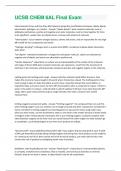
-
UCSB CHEM 6AL Final Exam Questions With 100% Correct Answers.
- Examen • 16 pages • 2024
- Disponible en pack
-
- $8.49
- + en savoir plus
Intermolecular forces and how they affect physical properties /purification techniques: dipole-dipole, electrostatic, hydrogen, ion, london, - Answer-*dipole-dipole*: polar covalent molecules such as aldehydes and ketones. positive and negative end. polar molecules must be close together for force to be significant. weaker than ion-dipole forces; increase with polarity of molecule. *electrostatic*: occur between charged species, cations and anions, and are responsible for very high MP and B...
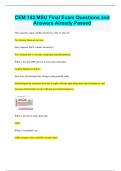
-
CEM 142 MSU Final Exam Questions and Answers Already Passed
- Examen • 26 pages • 2024
- Disponible en pack
-
- $9.99
- + en savoir plus
CEM 142 MSU Final Exam Questions and Answers Already Passed Does aqueous sugar conduct electricity, why or why not No, because there are no ions Does aqueous NaCl conduct electricity? Yes, because this is an ionic compound (metal/nonmetal) What is the only IMF present in non polar molecules London Dispersion Forces How does electronegativity change in the periodic table Electronegativity increases from left to right (with the right being most electronegative), and increases from bo...

Comment a-t-il fait cela? En vendant ses ressources d'étude sur Stuvia. Essayez-le vous-même ! Découvrez tout sur gagner de l'argent sur Stuvia


